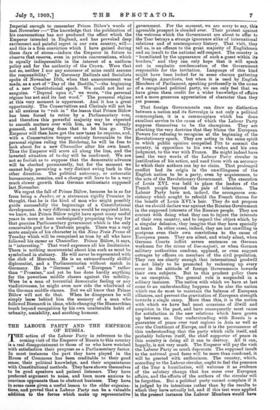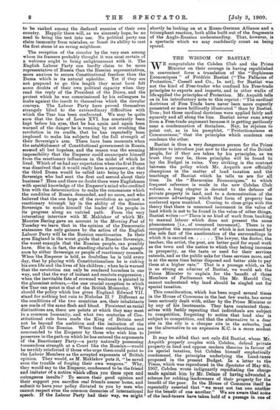THE LABOUR PARTY AND THE EMPEROR OF RUSSIA. T HE action
of the Labour Party in reference to the coming visit of the Emperor of Russia to this country is a real disappointment to those of us who have watched with satisfaction their progress as a Parliamentary factor. In most instances the part they have played in the House of Commons has been creditable to their good sense, their political knowledge, and their acquaintance with Constitutional methods. They have shown themselves to he good speakers and patient listeners. They have preferred argument to noise, and been more anxious to convince opponents than to obstruct business. They have In some cases given a useful lesson to the older organisa- tions, and proved that a Labour Party can be a valuable addition to the forces which make up representative government. For the moment, we are sorry to say, this agreeable prospect is clouded over. Their protest against the welcome which the Government are about to offer to the Tsar betrays a strange ignorance alike of international relations and of contemporary history. That visit, they tell us, is an offence to the great majority of Englishmen and an insult to the national self-respect. The country is "humiliated by the appearance of such a guest within its borders," and they can only hope that it will speak out in emphatic condemnation of the Government responsible for the invitation. Language of this kind might have been looked for in some obscure gathering of foreign Anarchists, but when it is used by English Members of Parliament, speaking professedly in the name of a recognised political party, we can only feel that we have given them credit for a wider knowledge of affairs and a more generous appreciation of character than they yet possess.
That foreign Governments can draw no distinction between a nation and its Sovereign is not only a political commonplace, it is a commonplace which has done excellent service to the cause of which the Labour Party suppose themselves to be the champions. They are attacking the very doctrine that they blame the European Powers for refusing to recognise at the beginning of the Revolutionary epoch. They are acting in the same spirit in which public opinion compelled Pitt to commit the country, in opposition to his own wishes and his own judgment, to the war with France. He might indeed have used the very words of the Labour Party circular in justification of his action, and used them with an accuracy to which their authors can lay no claim. That prolonged conflict had its origin in the unwillingness of the English nation to be a party, even by acquiescence, to the acts of the Revolutionary Government. The execution of Louis XVI. was held to place the leaders of the French people beyond the pale of toleration. The Labour Party have not, indeed, the courageous con- sistency which sought to rebuild the French throne for the benefit of Louis XVI.'s heir. They do not propose that we should declare war against the Russian Government in the supposed interests of the Russian people. They are content with doing what they can to injure the interests of their own country, and to imperil the object which, by a singular delusion, they imagine that they have specially at heart. In other cases, indeed, they are not unwilling to postpone even their own convictions to the cause of European peace. They are silent, and wisely silent, when German Courts inflict severe sentences on German workmen for the crime of lese-majeste, or when German military authorities condone, applaud, or even suggest outrages by officers on members of the civil population. They can see clearly enough that international goodwill is not likely to be promoted by reckoning up every error in the attitude of foreign Governments towards their own subjects. But to this prudent policy there is an exception. The general rule is suspended in a solitary instance. The nation with which we have at last come to an understanding happens to be also the nation which can do most to maintain the balance of European alliances, and prevent the gravitation of European strength towards a single camp. More than this, it is the nation with which we have had most occasions of illwill and suspicion in the past, and have consequently most cause for satisfaction in the new relations which have grown up between us. Our understanding with Russia is a guarantee of peace over vast regions in Asia as well as over the Continent of Europe, and it is the permanence of this understanding that the party which calls itself, and probably believes itself, the chief supporter of peace in this country is doing all it can to destroy. All it can, happily, is not very much. The Emperor will pay the visit the Labour Party so much deprecate. The supposed insult to the national good fame will be more than condoned, it will be greeted with enthusiasm. The country, which, according to the Labour circular, ought to feel the presence of the Tsar a humiliation, will welcome it as evidence of the salutary change that has come over European affairs, and the efforts of the authors of the circular will be forgotten. But a political party cannot complain if it is judged by its intentions rather than by the results to which they have actually led, and if this test were applied In the present instance the Labour Members would ba*e to be ranked among the declared enemies of their own country. Happily there will, as we sincerely hope, be no need to bring the test into use. No political party can claim immunity from mistakes, or boast its ability to cast the first stone at an erring neighbour.
The reception of the circular by the very men among whom its framers probably thought it was most certain of a welcome ought to bring enlightenment with it. The English Labour Party can hardly claim to be more representative of Russia than the Russian representatives, more anxious to secure Constitutional freedom than the Puma which is its natural upholder. Yet if they are not prepared to go this length they must have felt some doubts of their own political capacity when they read the reply of the President of the Puma, and the protest which he was commissioned by his colleagues to make against the insult to themselves which the circular conveys. The Labour Party have proved themselves strangely blind to the extraordinary difficulties with which the Tsar has been confronted. We may be quite sure that the fate of Louis XVI. has constantly been kept before his eyes, that lie has again and again been warned of the danger he is running by not crushing the revolution in its cradle, that he has repeatedly been implored to make his subjects feel the full strength of their Sovereign's arm. There have been moments when the establishment of Constitutional government in Russia seemed all but hopeless, and the reason was the seeming impossibility that the Emperor could emancipate himself from the reactionary influences in the midst of which he lived. Which of us had any expectation when the first Duma was dissolved that it would really have a successor, or that the third Puma would be called into being by the very Sovereign who had sent the first and second about their business ? Here and there no doubt there were Englishmen with special knowledge of the Emperor's mind who credited him with the determination to make the concessions which the condition of Russia demanded, and no more, and who believed that the one hope of the revolution as against a reactionary triumph lay in the ability of the Russian Sovereign to make himself the leader of his people in its progress along an untried path. From the very interesting interview with M. Maklakov of which Mr. Maurice Baring gave an account in the Morning Post of Tuesday we learn that in the opinion of the Democratic statesmen the only gainers by the action of the English Labour Party will be the Russian reactionaries. In their eyes England is the worst guide that a Russian Sovereign, the worst example that the Russian people, can possibly have. She is, in fact, the standing obstacle to the accept- ance by either Sovereign or people of reactionary counsels. When the Emperor is told, as doubtless he is told every day, that by playing with Constitutionalism he is risking his own life and the lives of his children ; when be is warned that the revolution can only be rendered harmless in one way, and that the way of instant and resolute suppression ; when the inevitable fate of crowned weakness is painted in the gloomiest colours,—the one crucial exception to which the Tsar can point is that of the British Monarchy. Why should the policy which has given England Edward VII. stand for nothing but ruin to Nicholas TI.? Different as the conditions of the two countries are, their inhabitants are made of the same flesh and blood. Persistent as racial distinctions are, there are points at which they may meet in a common humanity, and what two centuries of Con- stitutional rule have made the King of -Britain need not be beyond the ambition and the imitation of the Tsar of All the Russias. When these considerations are commended to the Emperor by those who wish him to persevere in the path on which he has entered the arguments of the Reactionary Party—a party naturally possessing tremendous strength at a Court like the Russian—would be terribly reinforced if those who urge them could point to the Labour Members as the accepted exponents of British opinion. They would, as M. Maklakov puts it, "be saved even the trouble of forging their own weapons." Why, they would say to the Emperor, condescend to be the friend and imitator of a nation which offers you these open and outrageous insults ? To secure their good opinion and their support you sacrifice real friends nearer home, and submit to have your policy dictated to you by men who cannot respect even the common decencies of international speech. If the Labour Party had their way, we might shortly be looting on at a Russo-German Alliance and a triumphant reaction, both alike built out of the fragments of the Anglo-Russian understanding. That, however, is a spectacle which we may confidently count on being spared.















































 Previous page
Previous page